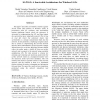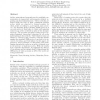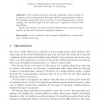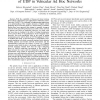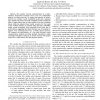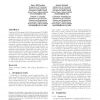IWIA
2005
IEEE
14 years 5 months ago
2005
IEEE
This paper1 describes survivability schemes against Access Point (AP) failures in Wireless LANs. It particularly aims for resiliency and survivability against multistage attacks w...
ISCC
2005
IEEE
14 years 5 months ago
2005
IEEE
The problem of computing bandwidth guaranteed paths for given flow requests in an ad-hoc network is complicated because neighboring links share the medium. We define the path wi...
ACSC
2005
IEEE
14 years 5 months ago
2005
IEEE
Ad-hoc networks are frequently used to establish communication in improvised environments without requiring any fixed infrastructure. These networks are formed with the help of t...
ADHOCNOW
2006
Springer
14 years 5 months ago
2006
Springer
We consider an ad-hoc network consisting of devices that try to gain access for transmission through a shared communication channel. We redesign randomized protocol of Cai, Lu and ...
GLOBECOM
2006
IEEE
14 years 5 months ago
2006
IEEE
It is shown in this paper that direct extensions of distributed greedy Interference Avoidance (IA) techniques for networks with centralized receivers to networks with multiple unc...
ICC
2007
IEEE
14 years 5 months ago
2007
IEEE
—With the availability of cheap and robust wireless devices there is demand for new applications in Vehicular Ad-hoc Networks (VANET). The challenge in implementing applications ...
GLOBECOM
2007
IEEE
14 years 5 months ago
2007
IEEE
Abstract— We consider two-hop communication of a delaysensitive, memoryless Gaussian source over two independent paths in an ad-hoc network. To capture the behavior an ad-hoc net...
KDD
2009
ACM
14 years 6 months ago
2009
ACM
Distributed PRocessing in Mobile Environments (DPRiME) is a framework for processing large data sets across an ad-hoc network. Developed to address the shortcomings of Google’s ...
